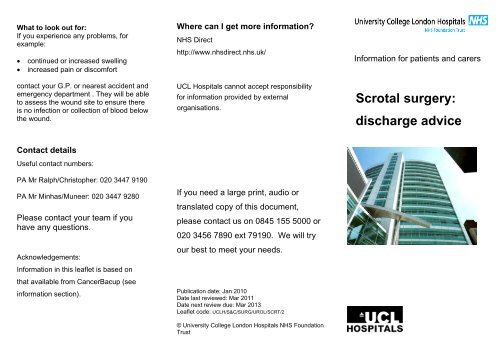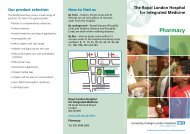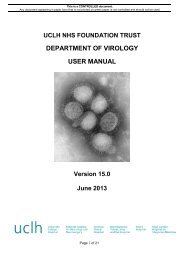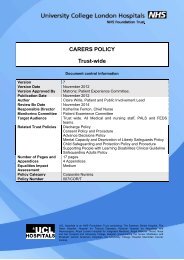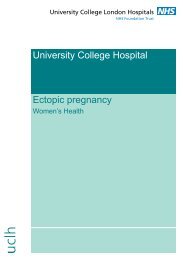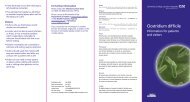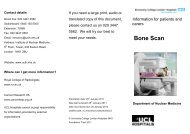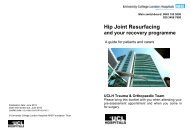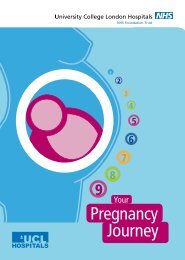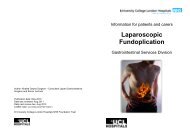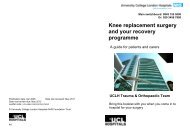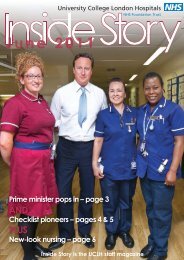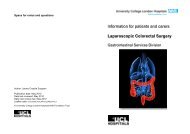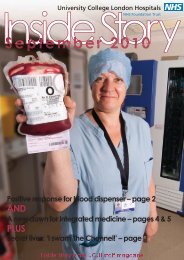Scrotal surgery - University College London Hospitals
Scrotal surgery - University College London Hospitals
Scrotal surgery - University College London Hospitals
You also want an ePaper? Increase the reach of your titles
YUMPU automatically turns print PDFs into web optimized ePapers that Google loves.
What to look out for:<br />
If you experience any problems, for<br />
example:<br />
• continued or increased swelling<br />
• increased pain or discomfort<br />
contact your G.P. or nearest accident and<br />
emergency department . They will be able<br />
to assess the wound site to ensure there<br />
is no infection or collection of blood below<br />
the wound.<br />
Where can I get more information?<br />
NHS Direct<br />
http://www.nhsdirect.nhs.uk/<br />
UCL <strong>Hospitals</strong> cannot accept responsibility<br />
for information provided by external<br />
organisations.<br />
Information for patients and carers<br />
<strong>Scrotal</strong> <strong>surgery</strong>:<br />
discharge advice<br />
Contact details<br />
Useful contact numbers:<br />
PA Mr Ralph/Christopher: 020 3447 9190<br />
PA Mr Minhas/Muneer: 020 3447 9280<br />
Please contact your team if you<br />
have any questions.<br />
Acknowledgements:<br />
Information in this leaflet is based on<br />
that available from CancerBacup (see<br />
information section).<br />
If you need a large print, audio or<br />
translated copy of this document,<br />
please contact us on 0845 155 5000 or<br />
020 3456 7890 ext 79190. We will try<br />
our best to meet your needs.<br />
Publication date: Jan 2010<br />
Date last reviewed: Mar 2011<br />
Date next review due: Mar 2013<br />
Leaflet code: UCLH/S&C/SURG/UROL/SCRT/2<br />
© <strong>University</strong> <strong>College</strong> <strong>London</strong> <strong>Hospitals</strong> NHS Foundation<br />
Trust
Introduction<br />
Your surgeon may have recommended<br />
<strong>surgery</strong> to the scrotum or its contents for<br />
your particular problem. This is usually<br />
done under general anaesthetic as a day<br />
case. The scrotum is the sac of skin<br />
which covers and holds your testicles.<br />
After the Procedure<br />
What you should NOT do:<br />
FOR THE FIRST 24 hrs YOU MUST<br />
NOT :<br />
• Drive a car<br />
• Drink alcohol<br />
• Operate machinery<br />
• Lift heavy objects, do gardening or go<br />
for long walks<br />
• Do not have a shower or bath<br />
• Have sexual relations<br />
• Sign documents / make important<br />
decisions<br />
• Return to work<br />
What you should do:<br />
FOR THE FIRST 24 hrs YOU SHOULD :<br />
• Rest quietly at home<br />
• Take pain killers as needed<br />
• Wear supportive underwear<br />
• Eat normally but drink plenty of<br />
fluids (at least three to four pints of<br />
fluid e.g water, fruit juice, tea or coffee)<br />
• Take care when using electrical<br />
appliances - your co-ordination may<br />
be affected<br />
Risks / Complications<br />
• Infection in the wound site<br />
• Swelling and bruising of the scrotum and<br />
penis.<br />
• Collection of blood under the wound<br />
(haematoma)<br />
General advice<br />
• Most stitches used in this type of <strong>surgery</strong><br />
are dissolvable. The nurses or the<br />
medical staff will inform you if they are<br />
not, you will receive an appointment with<br />
the nurse practitioner to have the<br />
stitches removed.<br />
• There may be some bruising and<br />
swelling of the scrotal area, wearing<br />
supporting underwear, such as a pad<br />
and pants may help reduce the swelling,<br />
Alternatively you may be discharged with<br />
a scrotal support. The bruising and<br />
swelling will lessen with time (approx. 2-<br />
4 weeks after <strong>surgery</strong>)<br />
• You may have a shower 2 days after the<br />
operation. It is important to shower at<br />
least once daily following this <strong>surgery</strong>.<br />
You may have a bath 2 weeks following<br />
<strong>surgery</strong>. This will allow the wound to heal<br />
should the stitches be dissolvable.<br />
• The wound area will be tender and<br />
possibly sore for a week or two after the<br />
operation. Mild painkillers such as<br />
Paracetamol and Ibuprofen will help<br />
ease the pain.<br />
• You should take at least one week off<br />
from your work, or return when the<br />
wound area feels ‘comfortable’. The<br />
nursing staff can provide you with a<br />
sick certificate. Please ask them to<br />
issue one.<br />
• It is advisable to refrain from sexual<br />
intercourse for a number of weeks<br />
depending on the type of <strong>surgery</strong> and<br />
then you should resume only if the<br />
wound site feels ‘comfortable’. Your<br />
medical team will advise you.<br />
• You will receive an out-patient<br />
appointment ___ weeks following<br />
discharge to check that the wound<br />
site has healed and that you have<br />
recovered from the operation.<br />
Specific Wound advice<br />
___________________________________<br />
___________________________________<br />
___________________________________<br />
___________________________________<br />
___________________________________<br />
___________________________________<br />
___________________________________<br />
___________________________________<br />
___________________________________<br />
___________________________________


